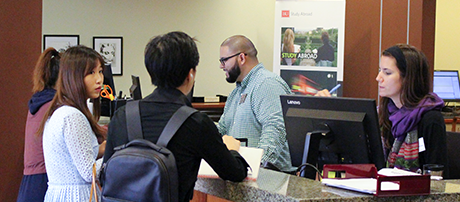Race and Ethnicity Abroad
Study abroad is an exciting experience, and you might be wondering about the people who will be part of your semester abroad, whether it is the other students in your program, the local university where you might be studying, or those living in the community. In every city around the world, there exists a unique racial and ethnic demographic. As you reflect on your own identity and how it might shape your study abroad experience, we encourage you to think about where you might find your sense of community and how you might connect with others who identify similarly to you, just as you’ve found your sense of belonging on campus.
It is important to consider your race and ethnicity when studying abroad and how these aspects of your identity might be perceived differently in other cultures. Race and ethnicity can take on new meaning when studying abroad, and cultural perceptions of ethnicity and race may vary significantly around the world. Understanding how your host culture embraces ethnicity, and how your racial or ethnic identity might shape your experience, will be helpful to reflect upon before you study abroad. Oftentimes, American students might be seen for their “American” identity before any other ethnic identities are considered. Even if you yourself are an international student you may be seen as American while abroad. We invite every student to review the resources below to reflect on and research how their study abroad experience might be influenced by their race and ethnicity; please reach out to our office if you have any specific concerns you’d like to discuss.
The following reflection questions may be helpful to consider:
- How do I decide which location will be best for me?
- Will there be other students of color in my program?
- How does my host culture define race and ethnicity in their country?
- How will I be perceived within my host community?
- What are some common perceptions and stereotypes about my race or ethnicity in my host country?
- Is there a history of racial or ethnic tension in my host country? Is the issue of immigration a source of racial or ethnic tension currently?
- How might my perception of my racial or ethnic identity shape my experience abroad?
- Will I be a part of a minority abroad, even if I am part of the majority at home or on-campus? How will this impact my experience?
- Someone said something I find offensive, are there cultural differences that would lead someone to say something that they don’t see as harmful?
- How should I react if I am in an uncomfortable situation?
- Will I experience discrimination in my host country based on the color of my skin? What resources will I have while on site regarding discrimination?
Race & Ethnicity General Resources
When preparing for an international experience, we encourage you to learn about cultural differences in your host country and to reflect about how your own identity might translate abroad. Our office is here to support you throughout this process, and we recommend reviewing the resources below to get started:
Creating Space & Finding Community
In almost every major city around the world, you can find communities of people from different racial and ethnic backgrounds. There is no better time than now for you to explore what the world has to offer.
You and your fellow program participants will be navigating and learning about a new place with different cultural norms. We encourage you to think about ways to give yourself some additional time and space to process your experience through the lens of your own identity as you are adjusting to your new community abroad. If you’re not comfortable being called something or being treated in any way that feels personal to you because of your race or ethnicity, you shouldn’t dismiss it because you might hear it’s “part of the host country’s culture.” Finding community outside of your program, through social media or other means, can be helpful for bolstering your sense of belonging in a new place and gaining a deeper understanding of the culture. Connecting with these communities can help you navigate these feelings when instances occur and support and guide you in setting boundaries.
Considerations for Asian, Asian American, Desi, & Pacific Islander Students
While some students will use studying abroad as an opportunity to return to their roots in the Asia-Pacific, others will decide to explore somewhere completely new to them. It’s undeniable that students have much to gain from a study abroad experience, no matter where they choose to study. You may experience stereotyping or inclusion, depending on where they choose to study.
Students studying in their country of origin have shared that it may be very liberating to share the same race and similar features as the majority culture, perhaps for the first time. They also report certain challenges, especially when locals assume a high language proficiency. Some students share that it is tiresome to have to explain time and again their “immigration story.” Students of South Asian descent (Indian, Bangladeshi, Pakistani, etc.) may also feel cultural pressures and perceptions in countries where a large and long-established South-Asian population already exists, relative to many parts of the U.S.
It might be helpful to consider how your unique identity might be perceived in comparison to others on your program, especially if you might be studying in a location where you share a racial background with the local population. Students have expressed the feeling that, depending on the situation or conversation, one of their identities might be more prevalent than the other, and locals have made assumptions about who you are and where you come from compared to other American students. One of the student testimonials highlighted below puts it well: in America, the “Asian” part of “Asian-American” feels most visible; while abroad in a non-Asian country, she was able to more fully embrace the “American” part of her identity.
It can be helpful to read about other experiences of Asian, Asian American, Desi, and Pacific Islander students while living or traveling in the area that you will be staying in, and we encourage you to connect with our study abroad alumni to learn from their stories as well. You might be a member of a specific group or club on campus that helps bring you that sense of community, and we recommend finding ways to replicate that in your new “home away from home,” whether that’s through social media, events, organizations, or your site staff abroad.
BU Resources & Community:
Additional Resources:
Considerations for Black Students
Historically, Black students have been underrepresented in study abroad; however, more and more Black students are pursuing study abroad experiences. Studying abroad can be a life-changing experience for students, but for Black students it can come with anxiety and fear of the unknown. You might have questions about how you will be perceived abroad being Black. How does my host country view and treat Black people? Are there other Black students in my program or at the local university where I’ll be studying? Will being Black affect my safety or sense of security?
Other countries may not have the same history with race that the United States does, but most countries have problems with racism and colorism that can affect your experience. In many countries without large Black populations, many local people’s ideas of what Black people look or act like stems from American media. This, coupled with the straightforward nature of many other cultures, can lead to questions or certain behaviors that might differ from your peers’ experiences. You may be in a country where local people use physical features, such as skin tone, for what they see as affectionate nicknames. In other places, you may encounter people who have never seen a Black person before, and they may ask to take photos with you or touch your hair. It can be helpful to read about other Black people’s experiences while living or traveling in the area that you will be staying in, and we encourage you to connect with our study abroad alumni to learn from their stories as well. You might be a member of a specific group or club on campus that helps bring you that sense of community, and we recommend finding ways to replicate that in your new “home away from home,” whether that’s through social media, events, or organizations abroad.
BU Resources & Community:
Additional Resources:
Considerations for Heritage Seekers
With the popularity of genealogical testing, more and more students are beginning to study abroad in the country of their ancestral history. Whether that be an Italian American going to Italy to study and visit their family’s small village, or a Korean American studying a semester in Seoul, studying abroad in your ancestral country can be an emotional experience for students. Students can experience mixed emotions when people in the host country view them as American rather than “one of them,” or overwhelmed visiting where their ancestors came from. It can be helpful to read about other experiences of heritage students while living or traveling in the area that you will be staying in, and we encourage you to connect with our study abroad alumni to learn from their stories as well. You might be a member of a specific group or club on campus that helps bring you that sense of community, and we recommend finding ways to replicate that in your new “home away from home,” whether that’s through social media, events, organizations, or your site staff abroad.
Additional Resources:
Considerations for Latine (o/a/x) Students
There is a rich diversity in the Latine community, and students can have differing needs and concerns depending on their own heritage. While some Latine students might be motivated to study abroad in an area where they have family roots or connections, others will explore somewhere completely new. For Latine students embarking on a study abroad experience, it is important to consider how language can shape their identity and experience abroad, in addition to how colloquial terms can differ, depending on the norms of the host country. The United States has a unique and complicated immigration history that has influenced both the American and Latine identity, and while other countries might not understand this, there might be similar histories depending on where you choose to study abroad.
How might you be perceived compared to your peers on the program, including those who also share the Latine identity? How might language influence your experience abroad? Will you be studying in a place where you might be perceived as a local, and what will it be like navigating those conversations? It can be helpful to read about other experiences Latine students have while living or traveling in the area that you will be staying in, and we encourage you to connect with our study abroad alumni to learn from their stories as well. You might be a member of a specific group or club on campus that helps bring you that sense of community, and we recommend finding ways to replicate that in your new “home away from home,” whether that’s through social media, events, organizations, or your site staff abroad.
BU Resources & Community:
Additional Resources:
Considerations for Native American Students
Being a Native American student can provide a unique perspective while studying abroad in your host country. Some of our host countries have a community of First People like the United States, which can provide a special cross-cultural opportunity for our Native American students to learn from the local community’s customs and traditions while sharing your own. Studying abroad can also provide the chance to learn from their experiences with incoming settlers. While you may feel kinship with the indigenous population of that country, you may also be viewed completely as an “American” and feel the implications tied to that identity or experience the discrimination of being an assumed part of that host country’s indigenous population.
Oftentimes, people in the host countries may base their view of Native Americans from the media or historical accounts. You may experience individuals asking questions about your lived experience. It can be helpful to read about other Native American students’ experiences while living or traveling in the area that you will be staying in, and we encourage you to connect with our study abroad alumni to learn from their stories as well. You might be a member of a specific group or club on campus that helps bring you that sense of community, and we recommend finding ways to replicate that in your new “home away from home,” whether that’s through social media, events, organizations, or your site staff abroad.
Additional Resources:
Navigating Colorism & Discrimination
Colorism is defined as prejudice or discrimination especially within a racial or ethnic group favoring people with lighter skin over those with darker skin. It is an issue that affects people of any nationality, ethnicity, or race, but its existence shouldn’t stop you from traveling the world and experiencing study abroad. Depending on where you study, skin color can have different meaning in terms of socio-economic class or markers of beauty; communities around the world engage in practices related to colorism in varying ways. As you are researching your host country and preparing for your study abroad experience, it might be helpful to consider the ways in which colorism might occur, both for yourself and for the people who live in the host culture.
Unfortunately, at any given time, across the globe and throughout history, specific communities have suffered from discrimination or violence because of the color of their skin or perceived race. If you encounter colorism or experience discrimination or violence of any kind, we have support structures in place, both locally and university-wide to support you.
If you experience discrimination while abroad there are resources to help you navigate the encounter. Your first step would be to contact the on-site staff. They are often best situated to offer resources and support and to assist in filing a complaint or a police report. If you are not comfortable working with on-site staff, there are a number of other Boston University resources available to you:
BU Resources & Community:
Complaint Procedures in Case of Alleged Unlawful Discrimination or Harassment
Additional Resources:
Mental Health Resources
Your health and well-being are important. BU Study Abroad automatically provides students with comprehensive health coverage through GeoBlue which includes mental health services. In addition, there are a number of university services that students can utilize, including Boston University’s Sexual Assault Response & Prevention Center (SARP). They provide 24-hour, confidential advocacy and assistance to student who have experienced a traumatic incident. Although their focus is sexual trauma and rape, they also assist survivors of physical assault, interpersonal violence and other crimes.
SARP
Crisis response: on call 24/7/365 at 617-353-SARP (7277). When you are calling after 5:00pm, or on a weekend/holiday, you will hear a message saying you have reached SARP, the office is closed. Then a pause followed by instructions to press 1 to leave a non-urgent voicemail or 2 to speak with the Crisis Counselor on call.
In addition, Boston University Behavioral Medicine is available for telehealth visits. They also have a 24/7 on-call counselor. Contact them at 617-353-3569 to schedule a Telehealth appointment or for any assistance.
If you don’t feel represented on this page or if you feel that other terminology should be included, please reach out to us to contribute your thoughts and ideas. This is a living document that is a work in progress that we’d like you to collaborate with us on. If you would like additional resources, or if you have found your own resources that other students could benefit from, please don’t hesitate to contact us at abroad@bu.edu.


